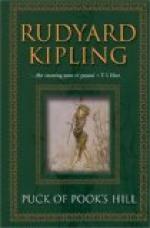’"He has gone to his own country,” said he. “He rose up in the night while we were beating out of that forest in the mud, and said that he could see it behind the trees. He leaped out on the mud, and did not answer when we called; so we called no more. He left the Wise Iron, which is all that I care for—and see, the Spirit still points to the South.”
’We were troubled for fear that the Wise Iron should fail us now that its Yellow Man had gone, and when we saw the Spirit still served us we grew afraid of too strong winds, and of shoals, and of careless leaping fish, and of all the people on all the shores where we landed.’
‘Why?’ said Dan.
’Because of the gold—because of our gold. Gold changes men altogether. Thorkild of Borkum did not change. He laughed at Witta for his fears, and at us for our counselling Witta to furl sail when the ship pitched at all.
’"Better be drowned out of hand,” said Thorkild of Borkum, “than go tied to a deck-load of yellow dust.”
’He was a landless man, and had been slave to some King in the East. He would have beaten out the gold into deep bands to put round the oars, and round the prow.
’Yet, though he vexed himself for the gold, Witta waited upon Hugh like a woman, lending him his shoulder when the ship rolled, and tying of ropes from side to side that Hugh might hold by them. But for Hugh, he said—and so did all his men—they would never have won the gold. I remember Witta made a little, thin gold ring for our Bird to swing in.
’Three months we rowed and sailed and went ashore for fruits or to clean the ship. When we saw wild horsemen, riding among sand-dunes, flourishing spears, we knew we were on the Moors’ coast, and stood over north to Spain; and a strong south-west wind bore us in ten days to a coast of high red rocks, where we heard a hunting-horn blow among the yellow gorse and knew it was England.
’"Now find ye Pevensey yourselves,” said Witta. “I love not these narrow ship-filled seas.”
’He set the dried, salted head of the Devil, which Hugh had killed, high on our prow, and all boats fled from us. Yet, for our gold’s sake, we were more afraid than they. We crept along the coast by night till we came to the chalk cliffs, and so east to Pevensey. Witta would not come ashore with us, though Hugh promised him wine at Dallington enough to swim in. He was on fire to see his wife, and ran into the Marsh after sunset, and there he left us and our share of gold, and backed out on the same tide. He made no promise; he swore no oath; he looked for no thanks; but to Hugh, an armless man, and to me, an old cripple whom he could have flung into the sea, he passed over wedge upon wedge, packet upon packet of gold and dust of gold, and only ceased when we would take no more. As he stooped from the rail to bid us farewell he stripped off his right-arm bracelets and put them all on Hugh’s left, and he kissed Hugh on the cheek. I think when Thorkild of Borkum bade the rowers give way we were near weeping. It is true that Witta was an heathen and a pirate; true it is he held us by force many months in his ship, but I loved that bow-legged, blue-eyed man for his great boldness, his cunning, his skill, and, beyond all, for his simplicity.’




